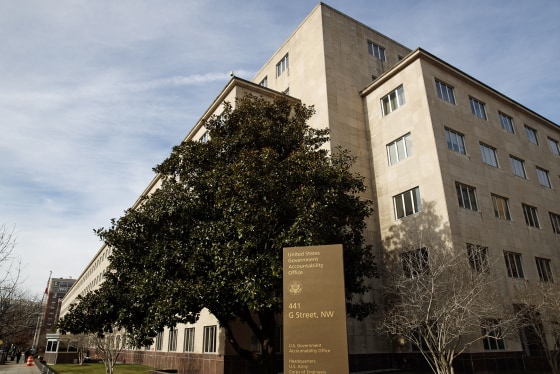Gene Dodaro, comptroller general of the Government Accountability Office, is on Capitol Hill Tuesday to present his agency’s report on areas of government ripe for improvement and at high risk of waste, fraud and abuse — a more traditional perspective on a hot issue in the era of Elon Musk’s Department of Government Efficiency.
The updated report will cite $84 billion in savings over the last two years as Congress and the executive branch followed hundreds of GAO recommendations as to how billions more could be saved.
DOGE has been firing off tweets about purported savings, cutting staff indiscriminately throughout the government and claiming inflated savings of $65 billion found over the last month, and Musk and his allies have been portraying the new effort as if no one in government is hunting for waste or ways things can be done more efficiently.
But the GAO is the government’s long-established chief watchdog, with a team of more than 3,000 auditors and government analysts who regularly pump out reports aimed at making the government run better and finding real risk for fraud and abuse.
There have been some areas of general agreement between Musk’s DOGE and the GAO.
Both DOGE and the GAO have commented publicly about the need to modernize the nation’s air traffic control system, reform the U.S. Postal Service, cancel contracts for empty federal office buildings and reduce improper payments in Medicare and Medicaid, which the GAO estimates costs the federal government more than $150 billion just last year.
“We've got to get rid of a lot of the buildings,” Dodaro said as he testified Tuesday.
But other areas the GAO has been pointing at for years have so far been skipped over by Musk’s team, including reforming the National Flood Insurance Program, overhauling federal prisons, improving federal disability programs or overhauling how NASA does its contracting. (Musk’s SpaceX is a major NASA contractor.)
Other DOGE moves run counter to alarm bells raised by the GAO.
For example, in addition to highlighting possible areas of fraud, the GAO notes in this report, as it has before, that the federal government is routinely leaving money on the table.
The Trump administration laid off more than 3,000 IRS employees last week, but the GAO notes that one of the key conclusions by the IRS this year was the difference in billions between taxes owed and taxes actually paid. The IRS also says it loses billions through identity theft.
The GAO says the Interior Department could also increase its revenue for the U.S. treasury by collecting millions more on oil and gas leases.
Dodaro will also highlight a new area of concern: disaster relief.
Government response to disasters is spread across 30 federal entities. In 2024 there were 27 disasters with at least a billion dollars in economic damages each. Dodaro will highlight how repeated disasters have strained the Federal Emergency Management Agency and how federal agencies need “to deliver assistance as efficiently and effectively as possible and reduce their fiscal exposure.”
One agency targeted by DOGE, the Department of Housing and Urban Development, also plays a major role in disaster relief.
HUD is expected to face cuts of up to 50% of current staff. Cuts as high as 84% are expected to hit HUD’s staff at the Office of Community Planning and Development, which manages and distributes billions in disaster recovery funds to areas like western North Carolina hit by Hurricane Helene.
The GAO has said HUD needs to do more, not less, to oversee the funds it gives out for disasters such as monitoring progress in disaster recovery and ensure the “needs of disaster survivors are met in a timely manner.”
A HUD spokesperson told NBC News, “Disaster recovery will not be impacted.”
As a congressional agency, the GAO conducts audits of every federal entity. Typically members of Congress ask the GAO to audit government programs such as DOGE, and so far, according to the GAO, it has accepted three requests to audit DOGE.
The requests, which are from Democrats, include a review of DOGE’s interactions with federal government payment systems and the IT systems for three government agencies, as well as a review of data and payment systems at the Federal Emergency Management Agency.
Dodaro said that while he has not met with Musk, his team had a meeting with DOGE staffers at Treasury as part of the work requested by Congress. “We are just getting started,” he said, adding, “I expect and anticipate cooperation.”
Dodaro is retiring, and Tuesday marked his last testimony before Congress in his current role. Members from both sides of the aisle expressed appreciation for his decades of work.
Asked about DOGE and the recent firings of federal workers, Dodaro said he spent much of his career butting heads with bureaucracy.
“There is a need for change, but how you do it matters,” he said, and he cautioned that in conducting layoffs, the federal government should figure out what functions it no longer wants to provide and then figure out what to do with the people in those roles.
He also said that in some areas there needs to be more, not fewer, federal workers. The areas he mentioned included providing mental health care to veterans, as well as assessments of toxins by the Environmental Protection Agency and inspections of foreign drug manufacturers.
